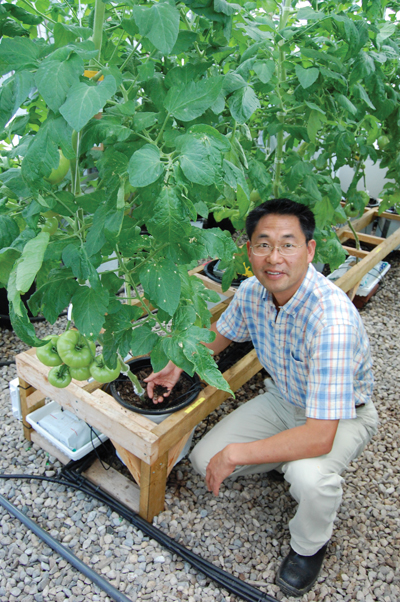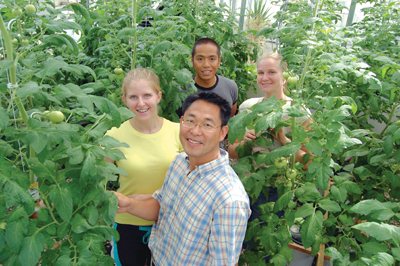Improved organics, from the ground up Guelph reseaJust some reading material that shows that our partnership with Guelph university is the real deal and if you ever get a chance to check out their Environmental Biology department and talk about Worm Castings you will be on the bid faster than you can say Holy Crap....
Cheers,
Brusselsprout
The demand for organic products in Canada has doubled every four yearsover the last two decades. But Canada’s low productive capacity fororganics has left 80 per cent of the market open to imports. Domesticsupply has not kept up with consumer demand.
However, new research at the
University of Guelph is working toreconcile the organic and local food movements, and put more locallygrown organics on Canada’s grocery shelves.
Prof. Youbin Zheng, Department of Environmental Biology, and his teamof researchers are investigating sustainable ways to enhance Canada’scapacity to produce locally grown organic produce. They’re developing agreenhouse production system, which will include new organic growingsubstrates, and determining optimum fertilization, biocontrol andirrigation regimens for producing organic greenhouse vegetables.

| |
Prof. Youbin Zheng
| |
 | |
Prof. Youbin Zheng (front), with project collaborators (from left) Victoria Surrage, Donny Cayanan and Claudia Lafreniere.
| |
WORKING ON RESEARCH-BASED GUIDELINES FOR GROWERSThe team’s findings will help create a set of protocols that willoffer Canadian growers research-based guidelines for organic production.
“Canada is at the top of the world in terms of greenhouse productiontechnology, because we have such a harsh environment,” says Zheng, “butprevious efforts with growing substrates have not been that successful.There wasn’t enough research to provide growers with information to getuniform and consistent organic growing substrates.”
Starting from the ground up, post-doctoral research fellow VictoriaSurrage is working with Zheng to design new substrates from wastematerials. Unlike the conventional greenhouse substrate, rockwool (madefrom heated rock spun into fibrous slabs), her new substrates useingredients such as composted manure,
vermicompost (worm castings),aged bark, coconut coir, perlite and vermiculite.
These substrates will be used in the greenhouse to provide support forgrowing plants and to balance their rootzone oxygen and wateravailability. Their organic composition will also help to providenutrients to the plants. And, unlike rockwool, which is anon-recyclable material, these new soilless growing substrates will bebiodegradable.
But biodegradable substrates can still benefit from fertilizers, a greenhouse staple.
STUDYING THE BENEFITS OF COMPOST TEAMaster’s degree student Claudia Lafreniere is working with Zheng todetermine the benefits of what’s called “compost tea” for organicsystems. This tea is made by steeping small amounts of compost in largequantities of aerated water until saturated with beneficial fungi andbacteria and poured onto plant roots and leaves. Compost tea may helpreduce fertilizer inputs by increasing nutrient cycling in the rootzone compared to direct application.
Lafreniere is also investigating ways to control pathogens ingreenhouse tomato transplants, which can ruin entire crops, withbeneficial micro-organisms. These biocontrols, such as the fungusClonostachys rosea (a naturally occurring inoculant, also known asEndoFine®), offer growers a natural method for protecting their cropsagainst harmful pathogens without using pesticides.
“It’s like a competition,” says Lafreniere. “If you colonize crops withmicrobes that aren’t going to hurt the plants, then the microbes thatdo hurt the plants can’t come in and take over.”
The research team is also developing a fertigation regimen forgreenhouse tomato production using new wireless root-zone sensorsengineered by master’s student and researcher, Donny Cayanan. Thewireless sensors are designed to measure electrical conductivity,volumetric water content and root zone temperature.
FERTILIZER REGIMENS TO OPTIMIZE YIELDS“We’re trying to determine which irrigation or fertigation regimen isthe most optimum to support plant growth and maximize crop yield,” saysCayanan.
Ultimately, the researchers hope their findings will help createprotocols for organic farmers that promote a more efficient, profitableand sustainable organic greenhouse industry in Canada.
Other project collaborators include University of Guelph Profs. MikeDixon and John Sutton, Department of Environmental Biology, researchtechnician Linping Wang and student Matt Hannaberg, as well as LindsayArthur and Amanda Culverwell from the Ontario Ministry of Agriculture,Food and Rural Affairs.
Funding for this research has been provided by the Ontario Ministry ofAgriculture, Food and Rural Affairs and the Ontario Centres ofExcellence.
Additional support has been provided by ForterraEnvironmental Corporation, Gro-Bark Ltd., Bluewater Produce Ltd., DingoFarms, Adjuvants Plus Inc. and Biofert Manufacturing Inc.